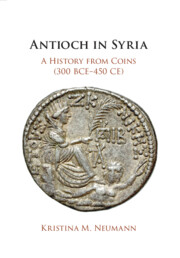Book contents
- Antioch in Syria
- Antioch in Syria
- Copyright page
- Dedication
- Contents
- Figures
- Tables
- Acknowledgments
- Chronology of Rulers
- Note for the Reader
- Abbreviations
- Introduction
- 1 Counting Change
- 2 Imperial Beginnings (300–129 BCE)
- 3 Imperial Transitions (129–31 BCE)
- 4 Provincial Negotiations (31 BCE–192 CE)
- 5 Imperial Creations (192–284 CE)
- 6 Imperial City (284–450 CE)
- Conclusion
- Book part
- Bibliography
- Index
Conclusion
Published online by Cambridge University Press: 20 August 2021
- Antioch in Syria
- Antioch in Syria
- Copyright page
- Dedication
- Contents
- Figures
- Tables
- Acknowledgments
- Chronology of Rulers
- Note for the Reader
- Abbreviations
- Introduction
- 1 Counting Change
- 2 Imperial Beginnings (300–129 BCE)
- 3 Imperial Transitions (129–31 BCE)
- 4 Provincial Negotiations (31 BCE–192 CE)
- 5 Imperial Creations (192–284 CE)
- 6 Imperial City (284–450 CE)
- Conclusion
- Book part
- Bibliography
- Index
Summary
The history of Antioch is that of a Greek polis, founded on non-Greek soil, which absorbed much from its new environment. It was as a polis that Antioch played its destined role, and it was through the various stages of its development as a city – Hellenistic, East Roman, Byzantine, pagan, and then Christian – that Antioch achieved its characteristic stamp and made its own special contribution to the history of civilization.
—Glanville Downey1- Type
- Chapter
- Information
- Antioch in SyriaA History from Coins (300 BCE–450 CE), pp. 295 - 306Publisher: Cambridge University PressPrint publication year: 2021



